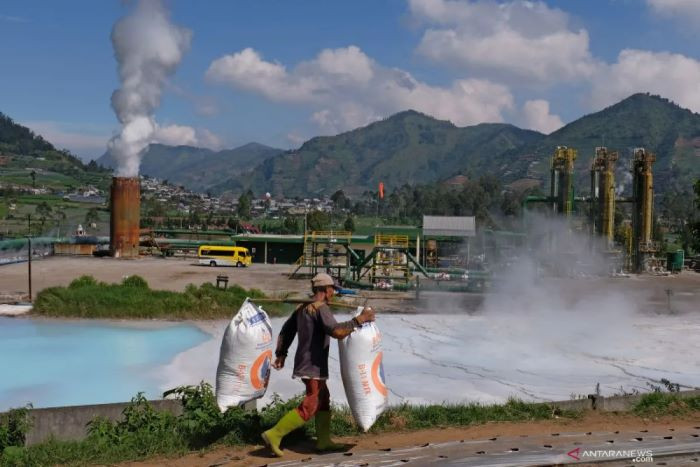Popular Reads
Top Results
Can't find what you're looking for?
View all search resultsPopular Reads
Top Results
Can't find what you're looking for?
View all search resultsIndonesia’s geothermal governance must empower locals
Giving local governments more autonomy and prioritizing human rights are key to advancing Indonesia’s renewable energy aims.
Change text size
Gift Premium Articles
to Anyone
G
eothermal energy is a crucial part of Indonesia’s plan to cut its greenhouse gas emissions to net zero by 2060. The country aims to add 5.2 gigawatts (GW) of installed capacity in 2025-2034, compared to a current capacity of 2.7 GW, Antara reported.
By 2060, it is targeting 22.7 GW of non-variable geothermal capacity, mainly through large-scale plants. With this goal, the aim is to attract investment in these power plants, which are intended to replace coal-fired facilities, meet the country’s net-zero objectives by providing a stable baseload supply and ensure grid reliability.
Indonesia possesses some of the world’s largest geothermal reserves, due to its proximity to tectonic plate boundaries, with estimates ranging from 23 to 29.5 GW, or about 40 percent of global geothermal potential.
Major geothermal fields are distributed across provinces such as Sumatra, Java, Sulawesi and East Nusa Tenggara (NTT). But strategic decisions, such as where to allow geothermal exploitation, remain the preserve of central rather than local governments.
Such centralization drives conflicts between the central government and local stakeholders and leads to community resistance against geothermal and other energy projects.
Under a 2018 regulation, the central government is authorized to designate areas where geothermal may be explored or exploited, known as “geothermal working areas” or WKPs. It is also authorized to assign state-owned enterprises or public service agencies to undertake such work within WKPs. A 2023 regulation strengthened the central government’s control of geothermal and other renewable resources by explicitly giving it the authority to issue recommendations for power generation projects.
This division of authority has often been a source of tension for local governments. The central government tends to emphasize national interests such as energy-mix targets and broad strategic investments when promoting geothermal and other energy development. Meanwhile, local stakeholders are typically more concerned with the direct implications for spatial planning, community livelihoods and environmental impacts in their territories.
The power imbalance also extends to the realm of raising and spending income.
Fiscal transfers and budgetary control are highly centralized. Local governments have only minor taxing powers, while major taxes remain under central control. Local authorities cannot set rates or broaden their tax base for significant revenue sources, making them dependent on central transfers for most of their budgets.
This places regions in a vulnerable position, particularly when the central government enforces budget efficiency measures or reallocates funds for other national interests.
Geothermal projects also often compromise local income. Farmers stand to lose Rp 470 billion in the first year of construction of geothermal power plants in three locations on Flores Island in NTT, according to economic modeling in a 2024 study by environmental NGO WALHI and the Center for Economic and Law Studies (CELIOS). The power plants will also compete with local communities for water.
Indonesia’s Energy Transition Roadmap, which sets geothermal energy as a pillar of power generation, was signed in April having been developed by the central government.
Projects such as the expansion of the Ulumbu geothermal plant, located in Poco Leok on the western side of Flores Island, play a key role in achieving the roadmap’s energy goals. However, according to the Alliance of Indigenous Peoples of the Archipelago, the project threatens to displace 4,506 people in 14 indigenous communities from 3,778 hectares of their ancestral land.
Residents refused the project, fearing it would threaten their ancestral lands, water sources and cultural heritage. At the Environment Day celebrations in September in Manggarai, the regency where Ulumbu is sited, protests allegedly faced intimidation from the regent and his supporters.
The development is another clear example of the power imbalance in Indonesia’s geothermal governance, which can be summed up as planned centrally, suffered locally.
Asymmetric decentralization enables more autonomy for local governments to manage the energy transition in their areas.
This system is applicable for several regions that have better readiness to assume greater autonomy in managing their energy transition agendas. Local governments’ readiness could be determined by development indicators such as the Regional Energy Transition Readiness Index developed by CELIOS, which is characterized by three dimensions: clean energy initiatives, economic resilience and government capacity.
This bottom-up approach positions regions as primary actors in accelerating the transition by granting them greater autonomy to design local energy plans, identify renewable resources and engage local stakeholders in decision-making processes.
According to the CELIOS Index, East Nusa Tenggara is still “showing opportunities for improvement”, with clean energy initiatives and economic resilience scoring low and medium on the index, suggesting that its institutional and technical readiness remain limited. Therefore, any move toward asymmetric decentralization for the province, and other regions at a similar level, should be accompanied by capacity building and economic support to ensure they can take on greater responsibilities effectively.
All of this is especially relevant as foreign investors are increasingly prioritizing human rights and environmental safeguards in their energy-transition investment decisions. A report from the United Nations-supported Principles for Responsible Investment highlights how human rights and environmental supply-chain due diligence are essential to prudent investment. Weak due diligence can trigger financial, operational and reputational losses.
By embracing asymmetric decentralization, future conflicts can potentially be avoided as affected communities are likely to have a stronger voice in the development of energy projects in their area. In doing so, Indonesia can transform geothermal projects from sources of resistance into pathways for inclusive development, community empowerment and a truly just energy transition that is also attractive to global investors.
---
Muhammad Arief Virgy is a researcher at the Habibie Center. Hanifah Alya Chaerunnisaa is a corporate lawyer and licensed advocate in Indonesia. The article was first published in Dialogue Earth.











